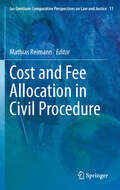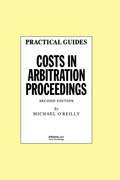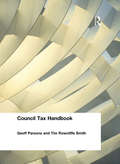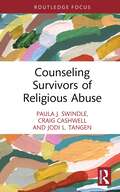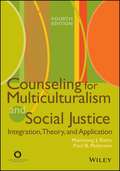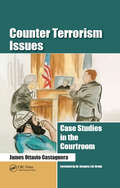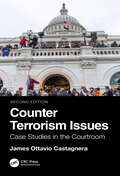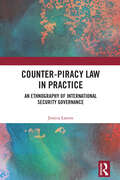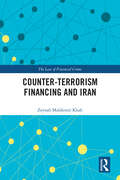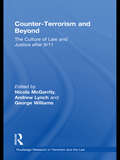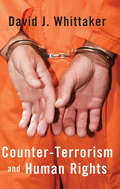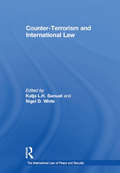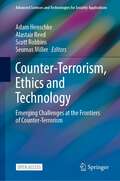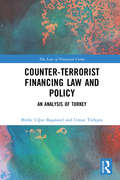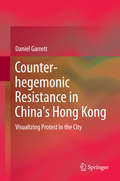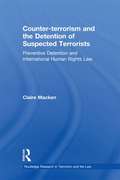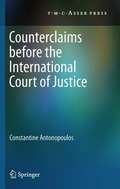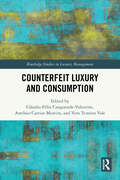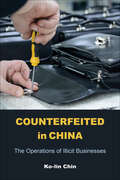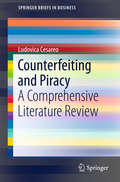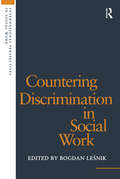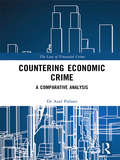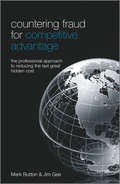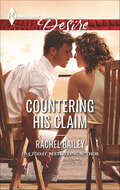- Table View
- List View
Cost and Fee Allocation in Civil Procedure: A Comparative Study (Ius Gentium: Comparative Perspectives on Law and Justice #11)
by Mathias ReimannThe volume describes and analyzes how the costs of litigation in civil procedure are distributed in key countries around the world. It compares the various approaches, draws general conclusions from that comparison, and presents global trends as well as common problems and solutions. In particular, the book deals with three principal questions: First, who pays for civil litigation costs, i.e., to what extent do losers have to make winners whole? Second, how much money is at stake, i.e., how expensive is civil litigation in the respective jurisdictions? And third, whose money is ultimately spent, i.e., how are civil litigation costs distributed through mechanisms like legal aid, litigation insurance, collective actions, and success oriented fees? Inter alia, the study reveals a general trend towards deregulation of lawyer fees as well as a substantial correlation between the burden of litigation costs and membership of a jurisdiction in the civil and common law families. This study is the result of the XVIIIth World Congress of Comparative Law held under the auspices of the International Academy of Comparative Law.
Costs in Arbitration Proceedings (Dispute Resolution Guides)
by Michael O'ReillyThis revised text provides a practical guide to the law relating to all aspects of costs in arbitration proceedings. The Arbitration Act 1996, has made significant changes to the law on arbitration costs. These have, among other things, made arbitrators responsible for the cost-effective management of cases, and given them new powers to help them achieve this. In its second edition, "Costs in Arbitration Proceedings" has been updated to include sections on: agreements as to costs; the arbitrator's power to limit costs; and forms and precedents. It sets out the law of costs for the parties and of the parties, the arbitrators' fees, taxation of costs, and security for costs, costs implications of offers of settlement and application to the court in repect of costs. It is suitable for professional arbitration lawyers and also for the new or lay arbitrator.
Council Tax Handbook
by Tim Smith Geoff ParsonsEG Council Tax Handbook is a timely publication. The text is easy to understand and very comprehensive. This volume helps to define the council tax in various contexts.
Counseling Survivors of Religious Abuse (Routledge Focus on Religion)
by Craig Cashwell Paula J. Swindle Jodi L. TangenThis book identifies and analyzes the forms, causes, and potential treatments of religious abuse. Religious abuse can include experiences of sexual, physical, emotional, spiritual, and mental abuse connected to a religious context. The book will help readers understand different types of religious abuse, including where the perpetrator is a religious leader, a group, or a system, as well as when there is an overtly spiritual element connected to the justification for the abuse. It also describes common experiences of those who have experienced religious abuse and some treatment approaches that will be useful to mental health providers when their clients present with these experiences. The rigorous scholarly approach of this book provides an academically grounded insight into this complex topic. As such, it will be a key reference for those studying and working in Religious Studies, Religion and Psychology, the Sociology of Religion, and Counseling and Mental Health.
Counseling for Multiculturalism and Social Justice: Integration, Theory, and Application (4th Edition)
by Paul Pedersen Manivong J. RattsIn this book, Drs. Ratts and Pedersen combine the very best from the multicultural and social justice traditions into a new paradigm, which will guide counselors toward a deeper understanding of the connections between these two counseling forces. Significantly updated and expanded from the previous edition, this fourth edition focuses on applying multiculturalism and social justice in various clinical settings with diverse client populations.
Counter Terrorism Issues: Case Studies in the Courtroom
by James Ottavio CastagneraThe American legal profession and judicial system bear a unique responsibility to set and maintain the balance between defending homeland security and protecting the civil liberties outlined in the Bill of Rights. These competing interests will continue to collide as the threats to our safety grow. Exploring the most significant terrorist cases of
Counter Terrorism Issues: Case Studies in the Courtroom
by James Ottavio CastagneraCounter Terrorism Issues: Case Studies in the Courtroom, Second Edition presents a panoramic view of the American judiciary’s handling of domestic terrorism in the last 30 years. As has played out in recent history, the American legal profession and judicial system bear a unique responsibility to set and maintain the balance between defending homeland security and protecting the civil liberties outlined in the Bill of Rights. These competing interests will continue to collide as the threats to our safety grow.The book examines some of the most notorious cases—the two attacks on the World Trade Center, the Oklahoma City bombing, and the Fort Hood massacre. Updates from the First Edition include a reflection on the Boston Marathon bombing, as well as an examination of the events of January 6, 2021, the subsequent legal proceedings and convictions of those involved in the assault on the U.S. Capitol, and the danger arising from increased domestic extremism and violent rhetoric from the right.Drawing extensively upon trial transcripts, witness statements, and judicial opinions, the book reviews the events and cases to demonstrate how the criminal justice system has grappled with conflicting facts and countervailing legal rights and responsibilities. Through the words of witnesses, judges, and the attorneys who tried these cases in America’s courtrooms, coverage provides important commentary on the historical/political contexts of these events, enabling readers to understand the significance of these infamous attacks on U.S. soil.
Counter-Piracy Law in Practice: An Ethnography of International Security Governance
by Jessica LarsenThis book is a socio-legal study of counter-piracy. It takes as its case the law enforcement efforts after 2008 to suppress piracy off the coast of Somalia. Through ethnographic fieldwork, the book invites the reader onto a Danish warship patrolling the western Indian Ocean for piracy incidents and into the courtroom in Seychelles, where more than 150 suspects were prosecuted. The aim is to understand how counter-piracy worked in practice. The book uses assemblage theory to approach law as a social process and places emphasis on studying empirical enforcement practices over analysing legal provisions. This supplements existing scholarship on the legal aspects of counter-piracy. Scholarship has mainly examined applicable law governing counter-piracy. This book steps into the field to examine applied law. Its methodology renders visible areas of legal ambiguity and identifies practices that suggest impunity and question legal certainty. It thus contributes with new policy-relevant knowledge for international security governance. The relevance is one of urgency. Counter-piracy off Somalia has served as a governance paradigm, which is replicated in other maritime domains. Consideration of the implications for policy is therefore needed. The book will be of interest to policy-makers, security practitioners and scholars who share a methodological commitment to practice.
Counter-Terrorism Financing and Iran (The Law of Financial Crime)
by Zeynab Malakouti KhahThis book blends doctrinal and empirical research to examine the phenomenon of counter-terrorism financing at the level of both international and Iranian national law. The work discusses the legitimacy, fairness and effectiveness of the international counter-terrorism financing framework, and then examines to what extent Iran has implemented it. The main focuses of the book are on the criminalisation of terrorism financing; financial regulations as preventive measures applied to the sectors at risk of terrorism financing, including the formal financial system, the informal financial system and the non-profit organisations; and the international and unilateral sanctions imposed on individuals and entities who support terrorist acts, terrorists and terrorist organisations. Given that terrorism and terrorism financing are socio-legal, political and economic phenomena in nature, the book approaches the problem of terrorism financing from an interdisciplinary perspective, exploring the relationship between the characteristics of Iran as a state recognised for supporting non-state militant actors (NSMAs), some of which are designated as terrorist by some countries. Empirical research includes documentary fieldwork in Iran, with the collection of original and primary materials that have not previously been analysed. The book also adopts a policy transfer approach, using the rules and regulations of the United Kingdom. Presenting a non-Western perspective on counter-terrorism financing, the book will be essential reading for students, researchers and policy-makers working in the area of financial crime.
Counter-Terrorism Strategies In A Fragmented International Legal Order
by Larissa van den Herik Nico SchrijverFew events have influenced our global order as intensely as the events of September 11, 2001. At various levels in the past ten years, persistent attempts have been made to address the threat of terrorism, yet there is still urgent need for a joint and coherent application of a variety of regulations relating to international criminal justice co-operation, the use of force and international human rights law. In an important contribution to international discourse, Larissa van den Herik and Nico Schrijver examine the relationship between different branches of international law and their applicability to the problem of terrorism and counter-terrorism. Using a unique combination of academic perspectives, practitioners' insights and a comprehensive three-part approach, Counter-terrorism Strategies in a Fragmented International Legal Order offers sound policy recommendations alongside thorough analysis of the state of international law regarding terrorism and provides fresh insights against the backdrop of recent practice.
Counter-Terrorism and Beyond: The Culture of Law and Justice After 9/11 (Routledge Research in Terrorism and the Law)
by Nicola McGarrityThis book considers the increasing trend towards a ‘culture of control’ in democratic countries. The post-9/11 counter-terrorism laws in nations such as the USA, the UK, Canada and Australia provide a stark demonstration of this trend. These laws share a focus on the pre-emption of crime, restrictions on the right to liberty of non-suspects, limited public access to information, and increased community surveillance. The laws derogate, in many respects, from the ordinary principles of the criminal justice system and fundamental human rights while also harnessing public institutions in the broader project of prevention and control. Distinctively, the contributors to this volume focus on the impact of these laws outside of the counter-terrorism context. The book draws together a range of experts in both public and criminal law, from Australia and overseas, to examine the effect of counter-terrorism laws on public institutions within democracies more broadly. Issues considered include changes to the role and functions of the courts, the expansion of executive discretion, the seepage of extraordinary powers and pre-emptive measures into other areas of the criminal law, and the interaction and overlap between intelligence and law enforcement agencies. Counter-Terrorism and Beyond: The Culture of Law and Justice After 9/11 will be of interest to students and scholars of criminal law, criminology, comparative criminal justice, terrorism and national security, public law, human rights, governance and public policy.
Counter-Terrorism and Human Rights
by David J. WhittakerThe ever-present threat of terrorism and the growing human-rights backlash against anti-terrorist policies are becoming ever more significant on the international stage. Constant media-coverage and public concern have characterised the debate over the last ten years.This book is a fair and objective assessment of counter-terrorist policy and human rights worldwide, and covers a wide breadth of international material. While raising key questions for reader consideration, this book aims for straight-forward consideration, leaving polemic to the reader.
Counter-Terrorism and International Law: Conflicting Or Cooperative Legal Orders? (The International Law of Peace and Security)
by Katja L.H. SamuelThe articles and essays in this volume consider the problem of international terrorism from an international legal perspective. The articles address a range of issues starting with the dilemma of how to reach agreement on what constitutes terrorism and how to encapsulate this in a legitimate definition. The essays move on to examine the varied responses to terrorism by states and international organisations. These responses range from the suppression conventions of the Cold War, which were directed at criminalising and punishing various manifestations of terrorism, to more coercive, executive-led responses. Finally, the articles consider the role of the Security Council in developing legal regimes to combat terrorism, for example by the use of targeted sanctions, or by general legislative measures. An evaluation of the contribution of the sum of these measures to the goals of peace and security as embodied in the UN Charter is central to this collection.
Counter-Terrorism, Ethics and Technology: Emerging Challenges at the Frontiers of Counter-Terrorism (Advanced Sciences and Technologies for Security Applications)
by Seumas Miller Adam Henschke Alastair Reed Scott RobbinsThis open access book brings together a range of contributions that seek to explore the ethical issues arising from the overlap between counter-terrorism, ethics, and technologies. Terrorism and our responses pose some of the most significant ethical challenges to states and people. At the same time, we are becoming increasingly aware of the ethical implications of new and emerging technologies. Whether it is the use of remote weapons like drones as part of counter-terrorism strategies, the application of surveillance technologies to monitor and respond to terrorist activities, or counterintelligence agencies use of machine learning to detect suspicious behavior and hacking computers to gain access to encrypted data, technologies play a significant role in modern counter-terrorism. However, each of these technologies carries with them a range of ethical issues and challenges. How we use these technologies and the policies that govern them have broader impact beyond just the identification and response to terrorist activities. As we are seeing with China, the need to respond to domestic terrorism is one of the justifications for their rollout of the “social credit system.” Counter-terrorism technologies can easily succumb to mission creep, where a technology’s exceptional application becomes normalized and rolled out to society more generally. This collection is not just timely but an important contribution to understand the ethics of counter-terrorism and technology and has far wider implications for societies and nations around the world.
Counter-Terrorist Financing Law and Policy: An analysis of Turkey (The Law of Financial Crime)
by Burke Uğur Başaranel Umut TürkşenSince the 9/11 attacks the world has witnessed the creation of both domestic and international legal instruments designed to disrupt and interdict the financial activities of terrorists. This book analyses the counter-terrorist financing law (CTF), policy and practice at the national level, focusing on Turkey. The work examines the limits and capabilities of CTF efforts on terrorism threats and determines the effectiveness of CTF efforts in Turkey, a country which has a pivotal role in terms of countering terrorism regionally and internationally. <P><P>The Turkish case-study is supported by an empirical study involving 37 semi-structured interviews with CTF practitioners and law enforcement experts with different affiliations and backgrounds. The findings illustrate that Turkey’s CTF system has not obtained an adequate level of effectiveness as a result of lack of proper implementation of its policy in the bureaucratic, legal and operational spheres. It is evident that the administrative and legal systems in Turkey are established according to the ‘one-size-fits-all’ international CTF standards and thus are compliant with the international CTF benchmarks, yet the interviews reveal significant challenges at the implementation level including lack of training and financial security, heavy handed bureaucracy, inadequate coordination and communication between international and national levels. <P><P>The book will be an invaluable resource for academics, students and policy-makers working in the areas of financial crime and terrorism.
Counter-hegemonic Resistance in China's Hong Kong: Visualizing Protest in the City
by Daniel GarrettThis book and associated collection of visual data and sociological observations examine how the Hong Kong Special Administrative Region (SAR) has been visually re-imagined, transformed, and utilized by its subalterns in the post-Handover period to reproduce their aspirations and demands for greater democracy and social justice while simultaneously contesting the hegemonic pressure exerted by China under the "One Country, Two Systems" ideology. It provides a rich visual description and narrative of how Hong Kong's many repressed social and political actors have struggled to make their voices heard under its competitive authoritarian political system. The book addresses the growing scholarly interest in the visual analysis of global protests and social movements as salient sources of sociological data and on the creation of meaning. By innovatively tackling the visual culture and visuality of subaltern resistance in Hong Kong it contributes to our understanding of contentious SAR-China politics and the New Social Movement, and will be of great interest to Hong Kong, resistance, social movement, and visual studies scholars.
Counter-terrorism and the Detention of Suspected Terrorists: Preventive Detention and International Human Rights Law (Routledge Research in Terrorism and the Law)
by Claire MackenIn a regional, national and global response to terrorism, the emphasis necessarily lies on preventing the next terrorist act. Yet, with prevention comes prediction: the need to identify and detain those considered likely to engage in a terrorist act in the future. The detention of ‘suspected terrorists’ is intended, therefore, to thwart a potential terrorist act recognising that retrospective action is of no consequence given the severity of terrorist crime. Although preventative steps against those reasonably suspected to have an intention to commit a terrorist act is sound counter-terrorism policy, a law allowing arbitrary arrest and detention is not. A State must carefully enact anti-terrorism laws to ensure that preventative detention does not wrongly accuse and grossly slander an innocent person, nor allow a terrorist to evade detection.This book examines whether the preventative detention of suspected terrorists in State counter-terrorism policy is consistent with the prohibitions on arbitrary arrest and detention in international human rights law. This examination is based on the ‘principle of proportionality’; a principle underlying the prohibition on arbitrary arrest as universally protected in the Universal Declaration of Human Rights, and given effect to internationally in the International Covenant on Civil and Political Rights, and regionally in regional instruments including the European Convention on Human Rights. The book is written from a global counter-terrorism perspective, drawing particularly on examples of preventative detention from the UK, US and Australia, as well as jurisprudence from the ECHR.
Counterclaims before the International Court of Justice
by Constantine AntonopoulosCounterclaims, the right of a State sued by another State to bring its own counter-suit in the course of the same trial, may offer an opportunity to mitigate the effects of the original suit and help to resolve disputes between States that have more than one aspect. In recent years, counterclaims have been frequently presented at the International Court of Justice (ICJ). This book examines the counterclaims presented at the ICJ and at its predecessor, the Permanent Court of International Justice (PCIJ), during its 65 years of existence. It is the first study that focuses exclusively on the subject of counterclaims. It analyses the evolution of the germane provisions in the PCIJ and ICJ Rules of Procedure and the practice of the Court, especially in light of the relevant case-law of the ICJ. A useful source for academics and practitioners in International law.
Counterfeit Luxury and Consumption (Routledge Studies in Luxury Management)
by António Carrizo Moreira Cláudio Félix Canguende-Valentim Vera Teixeira ValeCounterfeiting is a widespread problem in the luxury market. To develop appropriate countermeasures, a comprehensive understanding of this phenomenon is crucial. This book provides a holistic approach to explore counterfeit luxury consumption.This edited volume seeks to identify new trends by examining three levels of analysis. First, it explores the macro level related to the brand, including corporate decisions and marketing strategies. Second, the meso level focuses on the influence of interpersonal and sociocultural contexts. Thirdly, the micro level examines intrapersonal and situational contingencies. With contributions from international experts, the book provides broad perspectives from both the demand and supply side of luxury counterfeiting, offering valuable insights to help mitigate the issue and improve counter strategies.Counterfeit Luxury and Consumption will be of interest to researchers, postgraduate students, and policymakers across the fields of luxury management, marketing, consumer behavior, brand management, and ethical and responsible business.
Counterfeited in China: The Operations of Illicit Businesses
by Ko-Lin ChinCounterfeiting tops the list of organized crimes committed worldwide, raking in nearly half a trillion dollars in 2019. The impact of this illicit business is felt by consumers, brand owners, state authorities, and workers, and it impacts the economy. Moreover, its proliferation has fueled the advancement of organized crime groups. In his illuminating study, Counterfeited in China, Ko-lin Chin investigates this lucrative industry and its emergence in China. His face-to-face interviews with counterfeiters — business owners, workers, facilitators, and key informants — in the hub of Guangzhou, China reveal how businesses that design, produce, and distribute fake and unauthorized luxury goods manage the risks inherent in their business. Counterfeited in China examines the individual and group characteristics of counterfeiters and their relationships with organized crime; analyzes the economic aspects of counterfeiting; assesses the relationships among counterfeiting, violence, and corruption; and seeks to understand the demand for counterfeit goods. Chin also discusses the role of Chinese authorities and other parties in the war against counterfeiting. Assessing the state of the industry and its future, Chin provides fascinating new insights into the modus operandi of counterfeiters.
Counterfeiting and Piracy: A Comprehensive Literature Review (SpringerBriefs in Business)
by Ludovica CesareoThis book aims to identify, analyze, and systematize the available research on counterfeiting and piracy published over a thirty-five year time span (1980-2015) in order to highlight the main trends in the illicit trade literature, propose suggestions for managers battling against illicit trade, and provide a starting point for future research. Counterfeiting and piracy, i. e. , the violation of intellectual property rights (IPRs), including trademarks, copyright, and patents, have been investigated across a multitude of fields, from ethics to marketing, from law to business, from criminology to psychology. While the number of contributions has been substantial, research on both demand and supply has been fragmented and has at times yielded contradictory results. In addition, the lack of an extensive, interdisciplinary, and up-to-date literature review has made it hard to fully understand what aspects of the phenomenon need further clarification in order to stem consumer demand and provide meaningful suggestions to companies combatting illicit trade daily. A systematization of the existing literature is absolutely paramount and this need is fully met by this book.
Countering Discrimination in Social Work (International Perspectives in Social Work)
by Bogdan LešnikDiscrimination? Isn't there enough talk about discrimination? Yes, indeed. That is why we have to begin countering discrimination. We need strategies that will make it inoperative or at least limit its scope. But first, we need to think how discrimination works and identify it where it works. It concerns far more than mere procedural hitches for which a few legal provisions will do. Countering Discrimination (Volume 1998 of International Perspectives in Social Work yearbook) brings papers that analyse mechanisms of social discrimination in a variety of such locations and bring proposals for counter-strategies. This is essential in social work if causes, rather than manifestations, of the problems it is concerned with are to be addressed. But it is also essential that everybody who opposes discrimination recognise its subtle and dispersed ways of operation in the human services, regardless of their own basic field of work. In this respect, the book will be useful to a very wide audience.
Countering Economic Crime: A Comparative Analysis (The Law of Financial Crime)
by Axel PalmerEconomic crime is a significant feature of the UK’s economic landscape and yet despite the government’s bold mission statements ‘to hold those suspected of financial wrongdoing to account’ as part of their ‘day of reckoning’ and ‘serious about white-collar crime’ agenda, there is a sense that this is still not being done effectively. This book examines the history of the creation of the UK’s anti-economic crime institutions and accompanying legislation, providing a critique of their effectiveness. The book analyses whether the recent regulatory regime is fit for purpose as well as being appropriate for the future. In order to explore how the UK’s economic crime strategies could be improved the book takes a comparative approach analysing policy and legislative responses to economic crime in the United States and Australia in order to determine whether the UK could or should import similar structures or laws to improve the enforcement of UK economic crime.
Countering Fraud for Competitive Advantage
by Mark Button Jim GeeSubstantially reduce the largely hidden cost of fraud, and reap a new competitive advantage. As the title suggests, Countering Fraud for Competitive Advantage presents a compelling business case for investing in anti-fraud measures to counter financial crime. It looks at the ways of reaping a new competitive advantage by substantially reducing the hidden cost of fraud. Aimed at a wide business community and based on solid research, it is the only book to put forward an evidence-based model for combating corporate fraud and financial crime. Despite its increase and capture of the news headlines, corporate fraud is largely ignored by most organizations. Fraud is responsible for losses of up to nine percent of revenues--sometimes more. Yet, most organizations don't believe they have a problem and don't always measure fraud losses. This highlights an area for capturing a competitive advantage--with the right counter-fraud strategy, massive losses due to the cost of fraud can be reduced for a fraction of the return. Advocates a new model for tackling fraud and illustrates theories with best practice examples from around the world The authors have close links with the Counter Fraud Professional Accreditation Board: Jim Gee is a world-renowned expert in the field, and has advised private companies and governments from more than 35 countries. Mark Button is Director of the leading Centre for Counter Fraud Studies, Portsmouth University, U.K. Organizations are losing millions of dollars to fraud. This book outlines a comprehensive approach to reducing financial crime and helping return some of the revenue lost to the cost of fraud.
Countering His Claim
by Rachel BaileyPassion sets sail in USA TODAY bestselling author Rachel Bailey's tale of high-stakes inheritance Never be distracted by a woman is hotel magnate Luke Marlow's golden rule, especially when the woman just inherited half his late uncle's luxury cruise liner. But ship's doctor Della Walsh is the exception. Her dignified beauty ignites Luke's desire despite his suspicions. Even so, he will gain full control of the ship at all costs. For Della, the ship has been a sanctuary. Now she has just three weeks to change Luke's mind and save the ship-until passion comes along and steers them off course....
